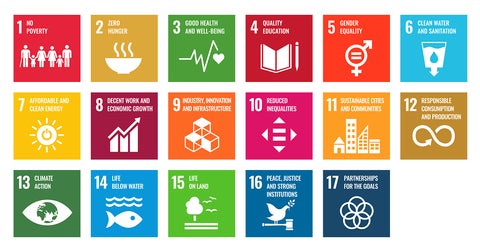A better future for all is possible. A more caring future, a more sustainable future, a more equitable future... the bright futures we imagine are improved in so many ways over what we have today. But while it is easy to see how things can be better, it is hard to see how to achieve that brighter future with our complex institutions and competing priorities. The United Nations (UN) Sustainable Development Goals (SDG)s are meant to guide countries and institutions in building that better future for all.
The 17 SDGs were unanimously adopted by the UN in 2015 to build prosperity, equity and a healthy planet. Each goal has multiple targets for 2030, plus indicators that together can guide policy and strategic decisions. The goals are a recognition that all countries can do better, and countries that are the furthest behind in these goals must be a priority for progress.
There is also a recognition that the SDGs are all interconnected. Increasing access to higher education, for example, can reduce poverty and gender inequalities while increasing economic opportunities. However, the same interconnectedness could generate dissonance between the goals. For instance, access to education is diminished in a society threatened with ecological degradation, war, or major climate disruptions.
In solving pressing challenges and building a better future, the higher education sector has an enormous role to play. Institutions are responding through growing dialogue, networks, and action to drive impact toward the SDGs. As such, the SDGs can be used by the University of Waterloo to understand how our institutional and community actions contribute to achieving the bright future we collectively seek.

At the University of Waterloo, the SDGs are an integral part of the campus Sustainability Strategy. The University of Waterloo is a host to SDSN Canada, an organization dedicated to implementing the SDGs through education, research, policy analysis and global cooperation. Waterloo is also a founding member of the University Global Coalition, which works with campuses from around the world to support implementation of the SDGs in education.
This report aims to provide a snapshot of the type of activity undertaken at the University of Waterloo which contributes to the SDGs. It introduces each SDG and provides a selection of representative case studies along with some key statistics or accomplishments
Icons are used to show how those case studies connect the four broad mechanisms by which the work has impact through: research, educational activities including academic courses and courses for the wider community, the operational practices carried out on campus, and community engagement activities.
This report provides a sample of SDG-related work, not an inventory. Many activities happening across campus were not included to maintain brevity. The case studies and accomplishments are meant to reflect prominent efforts, to showcase the range of ways in which Waterloo is supporting implementation of the SDGs from the local through the global. The report is meant to raise the profile of the SDGs, create opportunities for reflection, and inspire action.
The interconnectedness of the SDGs is one of their key features, creating both synergies for solving shared challenges and risks for failing to manage tradeoffs. For ease of synthesizing Waterloo’s actions, each case study was assigned to only one SDG, However, the work profiled in case studies often contributes to more than just the one SDG under which it was assigned.
The snapshots of SDGs are followed by a summary of research activity, international research collaborations, and courses related to the SDGs. The methodologies used for this analysis are outlined in the appendix.
Finally, an opportunities section highlights where the University of Waterloo can increase its impact both locally and globally.
Questions about the report can be directed to sustainability@uwaterloo.ca.
